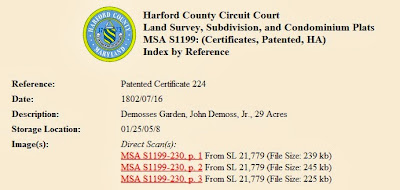In the absence of other information, genealogists are usually advised to conclude that "junior" and "senior" does not immediately indicate a son/father relationship. Usually what is safe to conclude from a junior and senior notation is that senior was in the area first or is older than junior.
Of course, one may find proof of the relationship in virtually any record.
This 1802 assignment of an interest in a piece of real estate confirms that John Demoss Junr. of Harford County, Maryland, was the son of John Demoss. Unfortunately John Demoss the father is not referenced as "senior" in this document, but it would be reasonable to conclude that he is the senior, unless records indicate to the contrary.
John Demoss' assignment of this property in 1802 indicates that he was alive on the date of the assignment. In fact, it is the last document on which his name appears. His transfer of his property rights may also indicate why no probate or estate settlement can be found for him. It may be that after this interest was transferred there was no real property in which he still had an interest.
Tax records for Harford County, Maryland, would confirm or deny this. I'll have to add those records to my research list.
Source:

